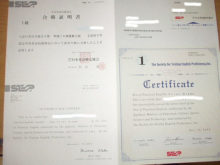このコンテンツではguessとsupposeの違いをまとめています。
一方は根拠のない”あてずっぽう”を指すことがあります。

英語類義語活用辞典、英語類義語使い分け辞典、ロングマン英々辞典を参考にしています。
- PR:Amazon
- 英語類義語活用辞典
↑”試し読み”とKindle版あります - 英語類義語使い分け辞典
英語類義語使い分け辞典の解説
思う
guess
supposeと同意だが、より略式的な語。
suppose
真実だと思うが、確信はない。
think
心の中で意見を持つ。
judge
評価し、見積もってから思う。
imagine
心の中にイメージを浮かべながら思う。
ロングマン英々辞典の解説
guess
1 to form a judgement(about)or risk giving an opinion(on)without knowing or considering all the facts.
“I don’t know the answer.””Well just guess!”
2 to get to know by guessing
”I suppose he’s late again.””You’ve guessed it!”
3 Ame to suppose; consider likely
I guess you don’t have time to go out now that you have young children.
suppose
1 to consider to be probable; ASSUME
As she’s not here, I suppose she must have gone home.
2 to believe; have as an opinion
He was generally supposed to have left the country.
3 to have as a condition; PRESUPPOSE
The company’s plan supposes a steady increase in orders.
英語類義語活用辞典の解説
guess と suppose はいずれも「~でしょう」といった、断言を避ける用法で使用されます。
和訳としてはほぼ同じですが、入れ替えできない用例は意外とたくさんあります。
guess はいわゆる”あてずっぽう”であり、推測の根拠がありません。対して suppose はどれほど頼りなくても主観的には根拠があり、それに基づく推測を指します。
This is a pure guesswork.
(これは何の根拠もないあてずっぽうです)
Your guess is as good as mine.
(あなたと私の推測は似たようなものだ)
It’s anybody’s guess.
(本当は誰にもわからない)
You could only guess what the final result of this project would be.
(この計画がどうなるかは想像するほかない)
You guessed right.
(正解でした)
You guessed wrong.
(不正解でした)
以上の guess を suppose と替えることはできません。suppose は一応、推理の体裁をとります。

Suppose you won a 10 million-yen lottery, what would you do with the money?
(1000万円の宝くじが当たったら、そのお金で何をしますか?)
Suppose for the sake of argument he was seen on the scene of crime, so were a lot of people.
(仮に彼が犯罪現場にいたとして、他にもたくさんの人がそこにいたんだ)
You were merely supposing the matter on the basis of hearsays
(あなたは聞きかじりの話を根拠に推測しているにすぎない)
以上のsupposeをguessと入れ替えはできません。

















